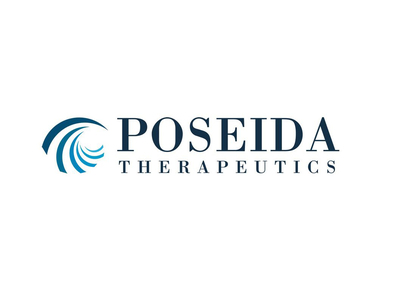Poseida Therapeutics to Present Interim Results from Phase 1 Trial of P-PSMA-101 at ASCO Genitourinary Cancers Symposium
Poseida Therapeutics (Nasdaq: PSTX) announced interim results from its Phase 1 trial of P-PSMA-101, an autologous CAR-T product for metastatic castrate-resistant prostate cancer (mCRPC), presented at the ASCO GU Symposium. Out of 14 evaluable patients, 71% showed PSA declines, with one achieving complete tumor elimination. The trial demonstrated a favorable safety profile, with manageable adverse events, including cytokine release syndrome. The ongoing study aims to further assess safety and efficacy, utilizing Poseida's proprietary genetic engineering technologies.
- 71% of patients (10/14) exhibited declines in PSA levels.
- One patient achieved a complete tumor response, maintaining a durable response for over ten months.
- Favorable safety profile with manageable treatment-emergent adverse events.
- Two patients experienced severe adverse events (grade 3 or higher) related to cytokine release syndrome.
Insights
Analyzing...
SAN DIEGO, Feb. 17, 2022 /PRNewswire/ -- Poseida Therapeutics, Inc. (Nasdaq: PSTX), a clinical-stage biopharmaceutical company utilizing proprietary genetic engineering platform technologies to create cell and gene therapeutics with the capacity to cure, today announced interim results from its Phase 1 clinical trial of P-PSMA-101, the Company's solid tumor autologous CAR-T product candidate to treat patients with metastatic castrate-resistant prostate cancer (mCRPC). These data are being presented today at the 2022 American Society of Clinical Oncology Genitourinary Cancers Symposium (ASCO GU) in a poster presentation entitled, "Phase 1 Study of P-PSMA-101 CAR-T Cells in Patients with Metastatic Castration-Resistant Prostate Cancer (mCRPC)." The presentation (Abstract 98/Poster E9) will be available on demand through the Symposium's virtual platform and during Poster Session A: Prostate Cancer today at 2:30 pm ET at ASCO GU, which is taking place in San Francisco and virtually February 17-19, 2022.
"The results being presented at ASCO GU continue to reinforce the potential for a CAR-T product to effectively treat solid tumor indications like prostate cancer," said Mark Gergen, Chief Executive Officer of Poseida Therapeutics. "We are excited by the initial responses seen even at the lowest doses and will continue to evaluate additional dosing regimens as we treat patients. We are also encouraged by the durable responses observed to date and look forward providing additional updates on this program as the trial progresses."
Of the 17 patients treated thus far, 14 were treated and evaluable at the cutoff date of December 31, 2021. Six patients were treated in the 0.25X106 cells/kg cohort (an average of about 22M cells), seven patients were treated in the 0.75X106 cells/kg cohort (an average of about 61M cells), and one patient was treated in the 2.0X106 cells/kg cohort (112M cells). All patients received a lymphodepletion regimen consisting of 30 mg/m2 fludarabine + 300 mg/m2 cyclophosphamide, prior to a single infusion of P-PSMA-101. Patients were heavily pre-treated, having received an average of seven prior lines of therapy with a median time since diagnosis of 6.4 years.
"The responses we have seen in this trial are impressive and speak to the innovative nature and potential of Poseida's CAR-T cell therapy platform," said Susan F. Slovin, M.D., Ph.D., with Memorial Sloan Kettering Cancer Center, an investigator who is presenting at the Symposium. "This interim update on the P-PSMA-101 trial shows the exceptional efficacy of this novel anti-PSMA CAR-T cell product. Thus far, at very low doses P-PSMA-101 has shown to produce a robust and durable anti-tumor response in heavily pretreated patients with mCRPC, including one pathologic complete response."
Efficacy
Standard responses were measured as per Prostate Cancer Working Group 3 (PCWG3) criteria including PSA, bone scans/CT, and exploratory biomarkers and novel tumor-targeted PET imaging (PSMA-PET, FDG). PET imaging was dependent on institutional availability.
Key findings included:
- 10/14 (
71% ) patients demonstrated measurable declines in PSA levels - 5/14 (
36% ) patients showed a decline in PSA levels of50% or more - One patient demonstrated evidence of complete tumor elimination and remains in a durable response of greater than ten months at the time of this presentation
- Clinical evidence confirmed by biopsy in several patients that the TSCM nature of the product resulted in trafficking of CAR-T cells to the bone, important in a bone-avid disease like prostate cancer
Safety and Tolerability
P-PSMA-101 demonstrated an acceptable safety and tolerability profile and most treatment-emergent adverse events in the trial were managed with early treatment. Six patients experienced grade 1/2 cytokine release syndrome (CRS), with two patients experiencing grade 3 or higher, including the previously reported case of Macrophage Activation Syndrome (MAS) exacerbated by patient non-compliance. Immune effector cell-associated neurotoxicity syndrome (ICANS) was experienced in two patients, both of which were manageable when treated rapidly with anti-cytokine agents and/or steroids. Common reported adverse events included headache, fatigue, chills and blurred vision but were overall well-tolerated.
The Phase 1 trial is an open label, multi-center, 3+3 dose-escalating study designed to assess the safety of P-PSMA-101 in up to 60 adult subjects with mCRPC. The primary objectives of this study are to determine the safety, efficacy, and maximum tolerated dose of P-PSMA-101. Additional information about the study is available at www.clinicaltrials.gov using identifier: NCT04249947.
About Poseida Therapeutics, Inc.
Poseida Therapeutics is a clinical-stage biopharmaceutical company dedicated to utilizing our proprietary genetic engineering platform technologies to create next generation cell and gene therapeutics with the capacity to cure. We have discovered and are developing a broad portfolio of product candidates in a variety of indications based on our core proprietary platforms, including our non-viral piggyBac® DNA Delivery System, Cas-CLOVER™ Site-specific Gene Editing System and nanoparticle- and AAV-based gene delivery technologies. Our core platform technologies have utility, either alone or in combination, across many cell and gene therapeutic modalities and enable us to engineer our portfolio of product candidates that are designed to overcome the primary limitations of current generation cell and gene therapeutics. To learn more, visit www.poseida.com and connect with us on Twitter and LinkedIn.
Forward-Looking Statements
Statements contained in this press release regarding matters that are not historical facts are "forward-looking statements" within the meaning of the Private Securities Litigation Reform Act of 1995. Such forward-looking statements include statements regarding, among other things, the potential benefits of Poseida's technology platforms and product candidates, Poseida's plans and strategy with respect to developing its technologies and product candidates and anticipated timelines and milestones with respect to Poseida's development programs and manufacturing activities. Because such statements are subject to risks and uncertainties, actual results may differ materially from those expressed or implied by such forward-looking statements. These forward-looking statements are based upon Poseida's current expectations and involve assumptions that may never materialize or may prove to be incorrect. Actual results could differ materially from those anticipated in such forward-looking statements as a result of various risks and uncertainties, which include, without limitation, risks and uncertainties associated with development and regulatory approval of novel product candidates in the biopharmaceutical industry and the other risks described in Poseida's filings with the Securities and Exchange Commission. All forward-looking statements contained in this press release speak only as of the date on which they were made. Poseida undertakes no obligation to update such statements to reflect events that occur or circumstances that exist after the date on which they were made, except as required by law.
![]() View original content to download multimedia:https://www.prnewswire.com/news-releases/poseida-therapeutics-to-present-interim-results-from-phase-1-trial-of-p-psma-101-at-asco-genitourinary-cancers-symposium-301484390.html
View original content to download multimedia:https://www.prnewswire.com/news-releases/poseida-therapeutics-to-present-interim-results-from-phase-1-trial-of-p-psma-101-at-asco-genitourinary-cancers-symposium-301484390.html
SOURCE Poseida Therapeutics, Inc.








